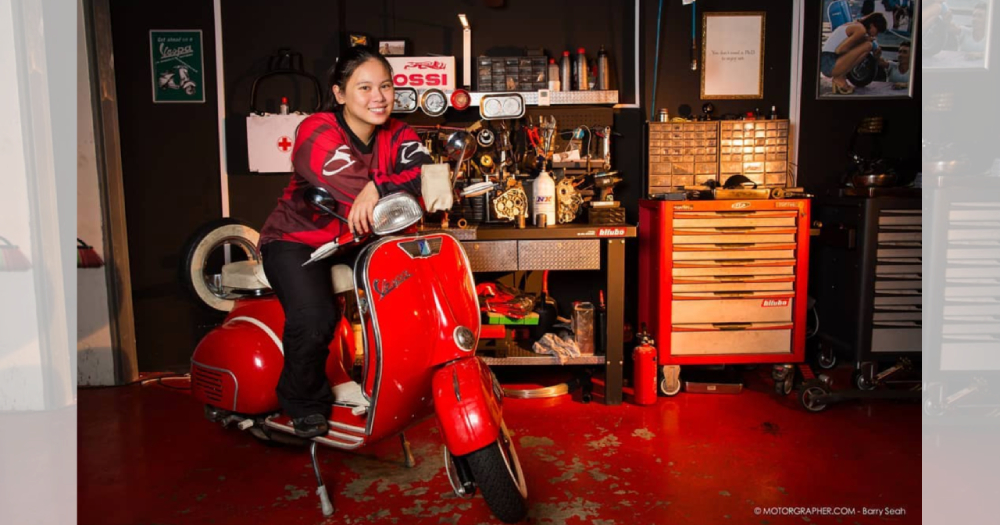When Juvena Huang was 20, she got herself a Vespa as a birthday present.
These days, second-hand Vespas cost anywhere between S$4,500 and S$16,000, but back when many things were much more affordable, she got hers at just S$2,000 — including, believe it or not, her certificate of entitlement.
Sitting down with us at a motorcycle-themed café tucked away in Lock Road, the 31-year-old shares that over the years of riding her Vespa, which she lovingly named "Ebony Rouge", she gained plenty more than just "freedom of mobility".
One big thing that stands out is certainly what got her a load of media attention a couple years ago: a two-year, three-month trip over land and all the way to Europe from Singapore, on her bike, which she has chronicled in a blog and in videos on Facebook and YouTube.
Another thing she found was an international community of bikers, which she now thinks of as a second family, willing to go above and beyond, even across countries, for a fellow biker who might happen to have found himself or herself in a bind.
But Huang is a traveller, or perhaps more precisely speaking, a wanderer. Hence her moniker, The Wandering Wasp ("vespa" is "wasp" in Italian), which while was created because of her epic overland trip, we would discover is an identity that she embodies.
But let's catch you up on that journey first.
27 months, 44,000km, S$23,000
Triggered by the shock of the sudden passing of a 28-year-old biker friend, Huang packed her bags, loaded up her Vespa and started her solo journey from Singapore to Europe on May 16, 2015, waved off by family, friends and even her Member of Parliament Pritam Singh:
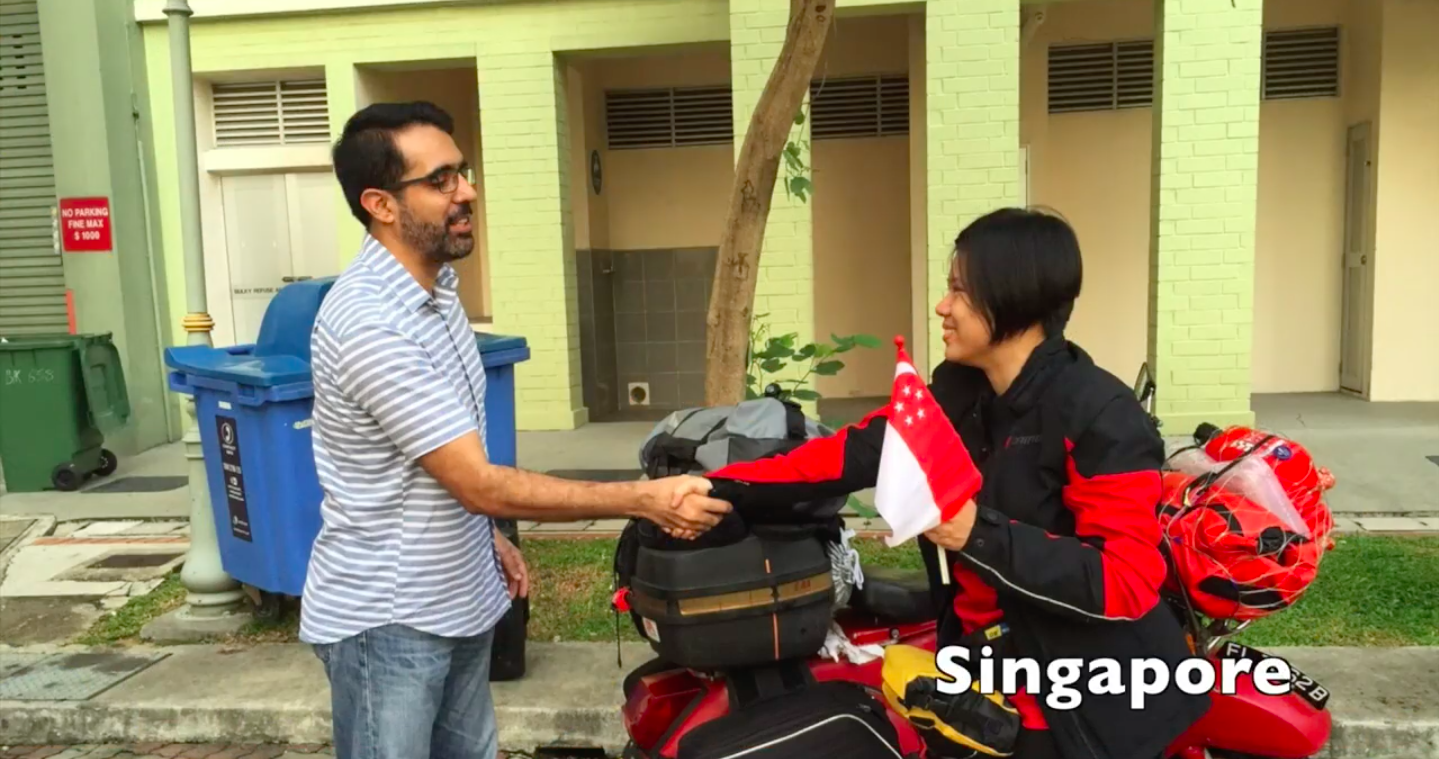 Screenshot via Wandering Wasp Facebook video
Screenshot via Wandering Wasp Facebook video
Her mode of transportation? Just her red and black Vespa (hence its name, Ebony Rouge).
In between, she passed through Southeast Asia, South Asia, the Balkans, and the Middle East.
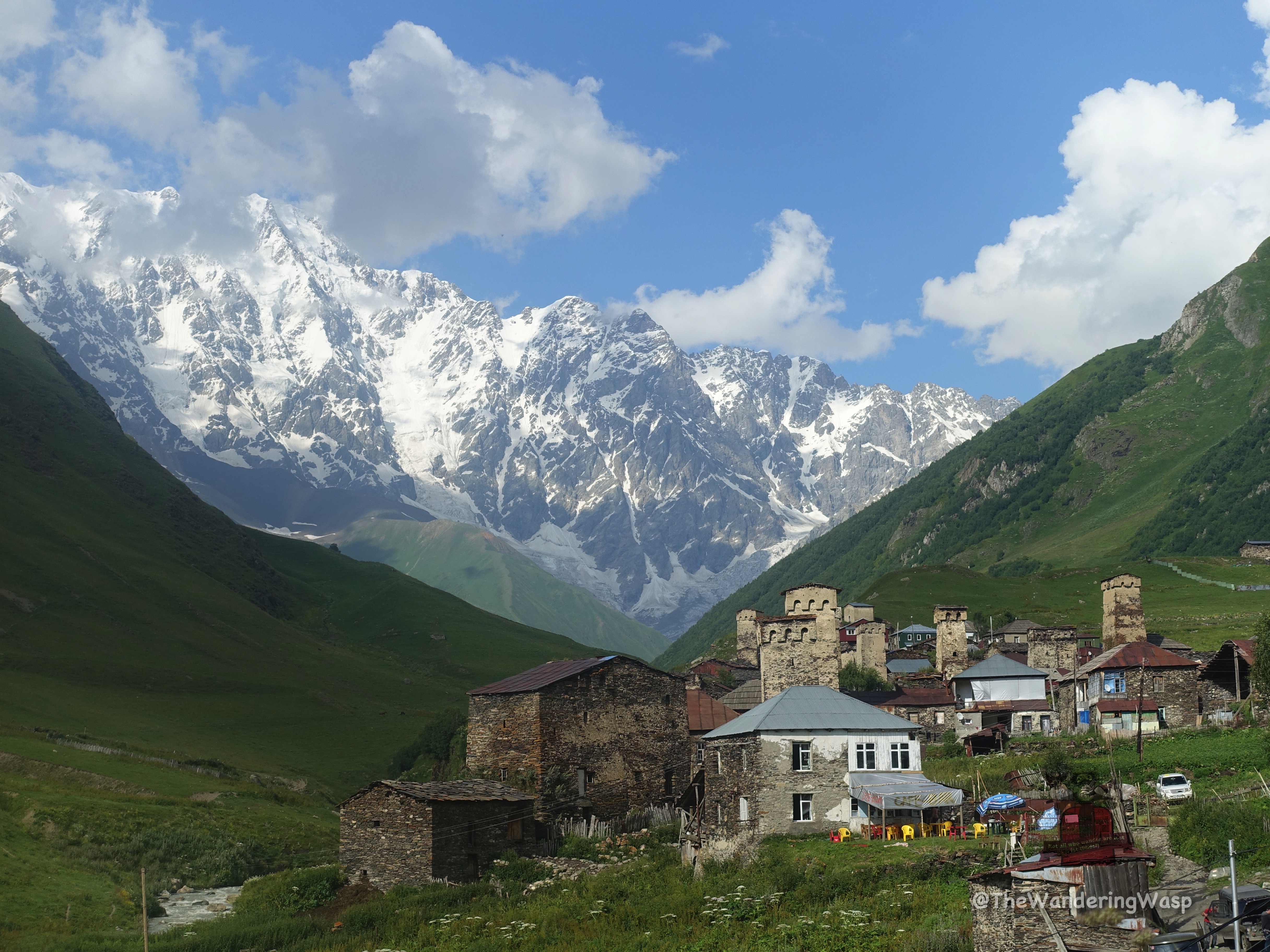 One of the highest village in Europe, Ushguli, Georgia. (Photo courtesy of Juvena Huang)
One of the highest village in Europe, Ushguli, Georgia. (Photo courtesy of Juvena Huang)
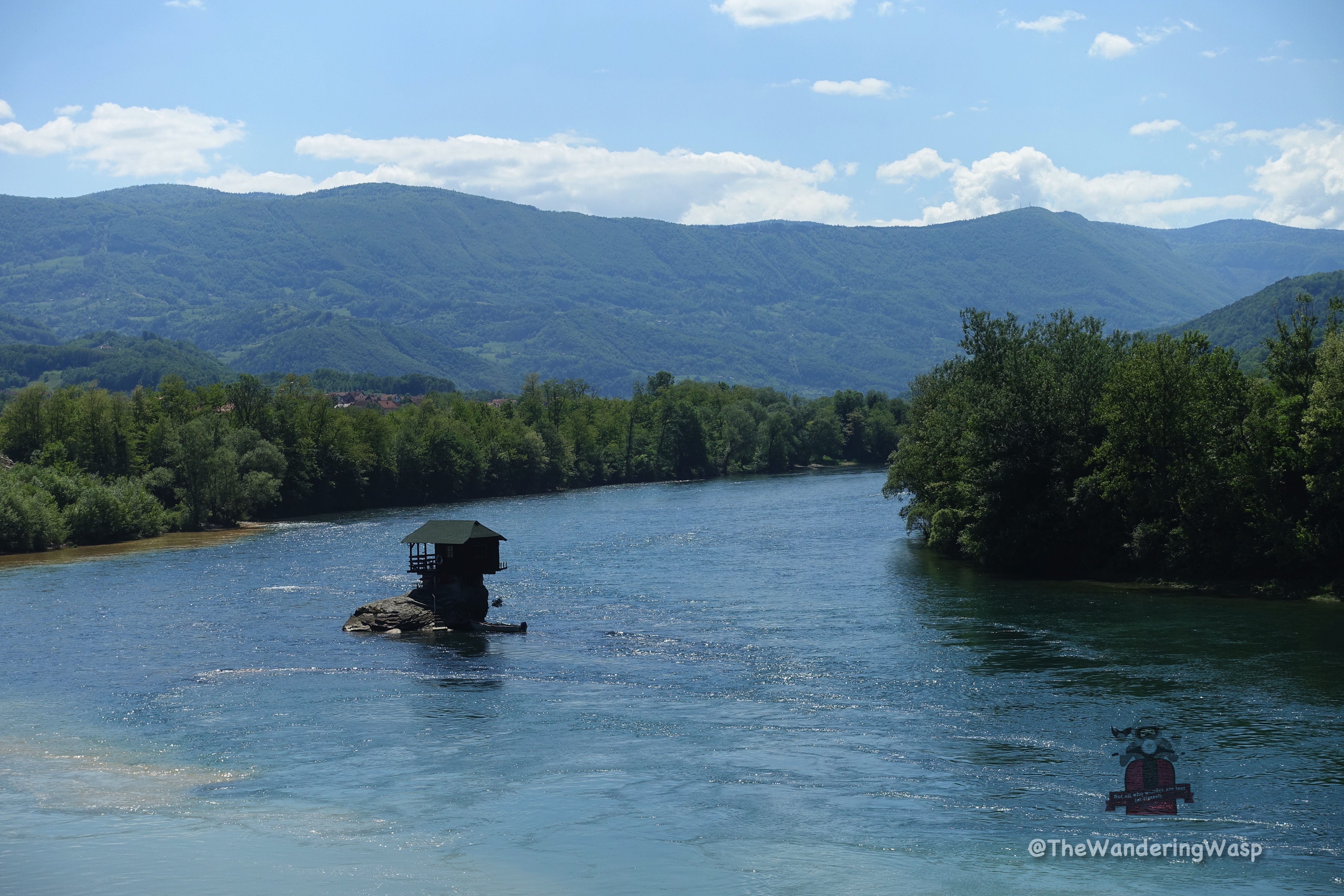 Drina river house on the river Drina, Serbia. (Photo courtesy of Juvena Huang)
Drina river house on the river Drina, Serbia. (Photo courtesy of Juvena Huang)
She lived simply while on the road, with the entirety of her belongings strapped onto the bike.
All that she had weighed a total of 50kg, but we were amazed by her level Asian superior packing skills.
Just look at this amazing graphic she created showing where everything was hidden:
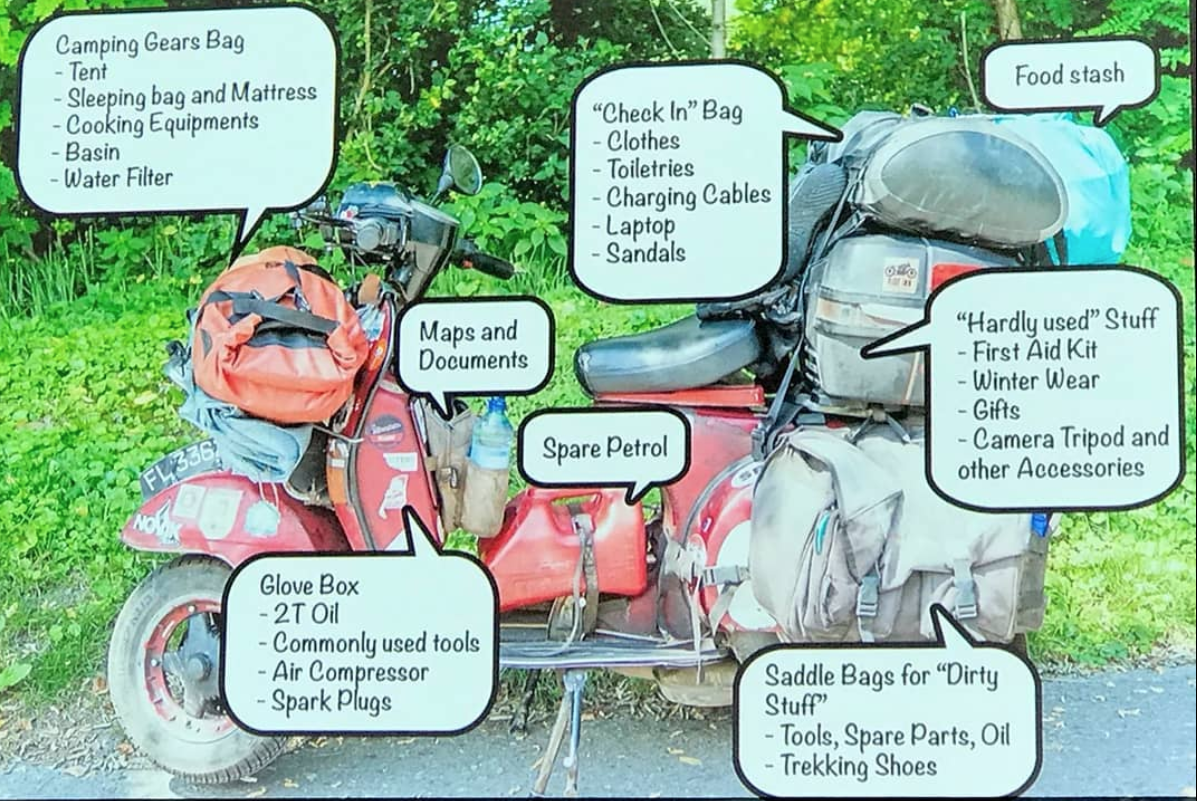 Everything Huang brought with her was compartmentalised according to their function. (Image via The Wandering Wasp)
Everything Huang brought with her was compartmentalised according to their function. (Image via The Wandering Wasp)
44,000 kilometres and 27 months later, she finally ended her journey in the Czech Republic, from where she flew home with her mom who went there to meet her, leaving her dear Vespa behind (this, she said, was like "breaking up with a boyfriend").
Huang's entire trip cost her in the ballpark of S$23,000 — which, if you think about it, is quite little considering the fact that she was travelling for more than two years (she originally budgeted S$30,000).
But of course, it was far more than the numbers that count — for her, what can't be counted or quantified in financial terms mattered the most: friends made, people met, and certainly experiences (near-death, infuriating, warm, stunning, amazing and everything else in between) she had.
She also went from being a complete mechanical noob to knowing how to assemble an entire motorbike engine from scratch now:
It's been more than a year since her return, but her eyes still light up recounting every one of these.
Where and how exactly did she go?
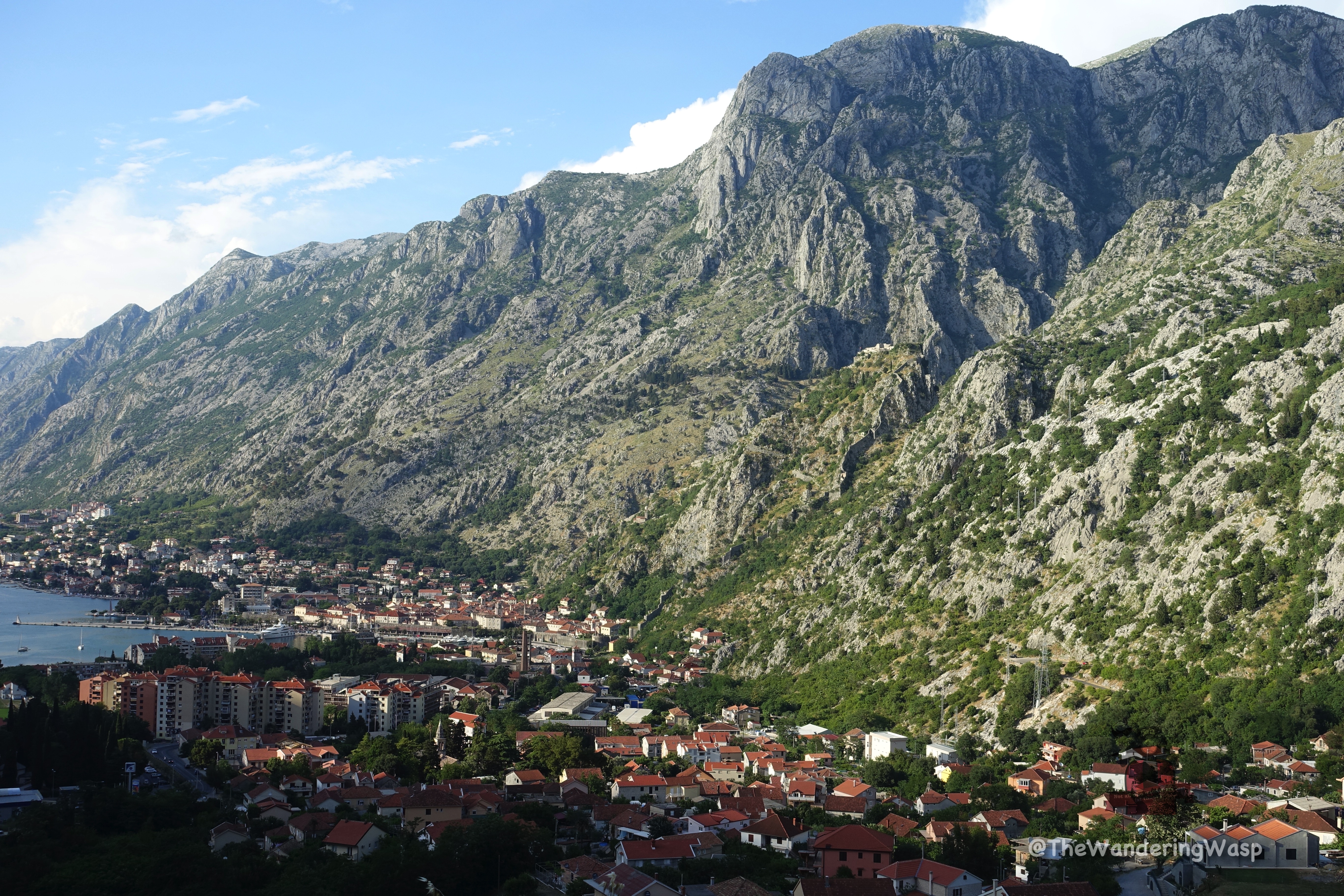 Kotor, a coastal town in Montenegro. (Photo courtesy of Juvena Huang)
Kotor, a coastal town in Montenegro. (Photo courtesy of Juvena Huang)
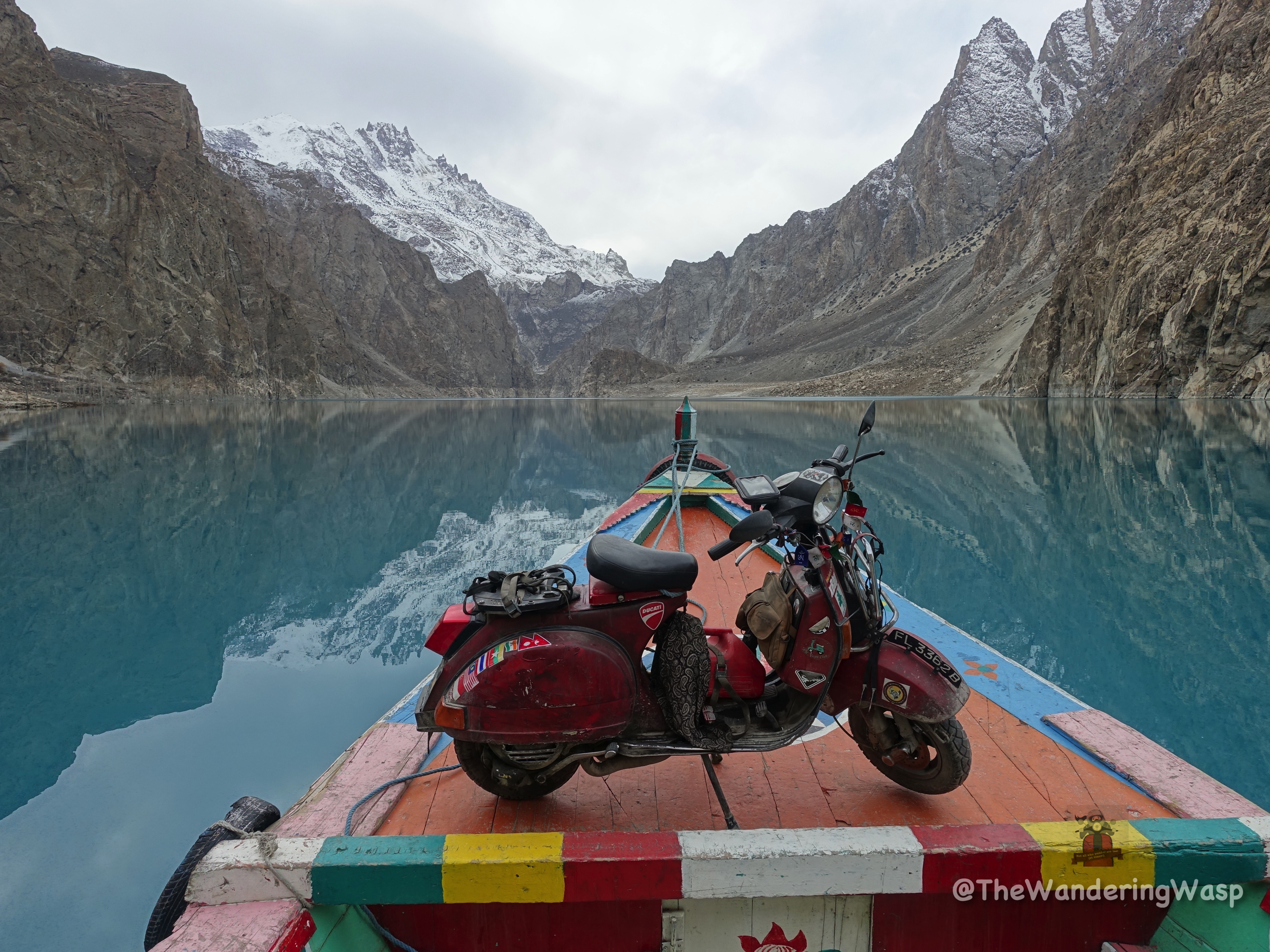 Attabad Lake in Pakistan. (Photo courtesy of Juvena Huang)
Attabad Lake in Pakistan. (Photo courtesy of Juvena Huang)
These are the 25 countries Huang visited, in this order, and sorted by region:
- (Southeast Asia) Malaysia, Thailand, Myanmar
- (South Asia) India, Nepal, Pakistan
- (Eurasia/Middle East) Iran, Armenia, Georgia, Turkey
- (The Balkans) Bulgaria, Macedonia, Serbia, Bosnia & Herzegovina, Croatia, Montenegro, Albania, Greece, Kosovo
- (Europe) Italy, Liechtenstein, Switzerland, Germany, Austria and Czech Republic
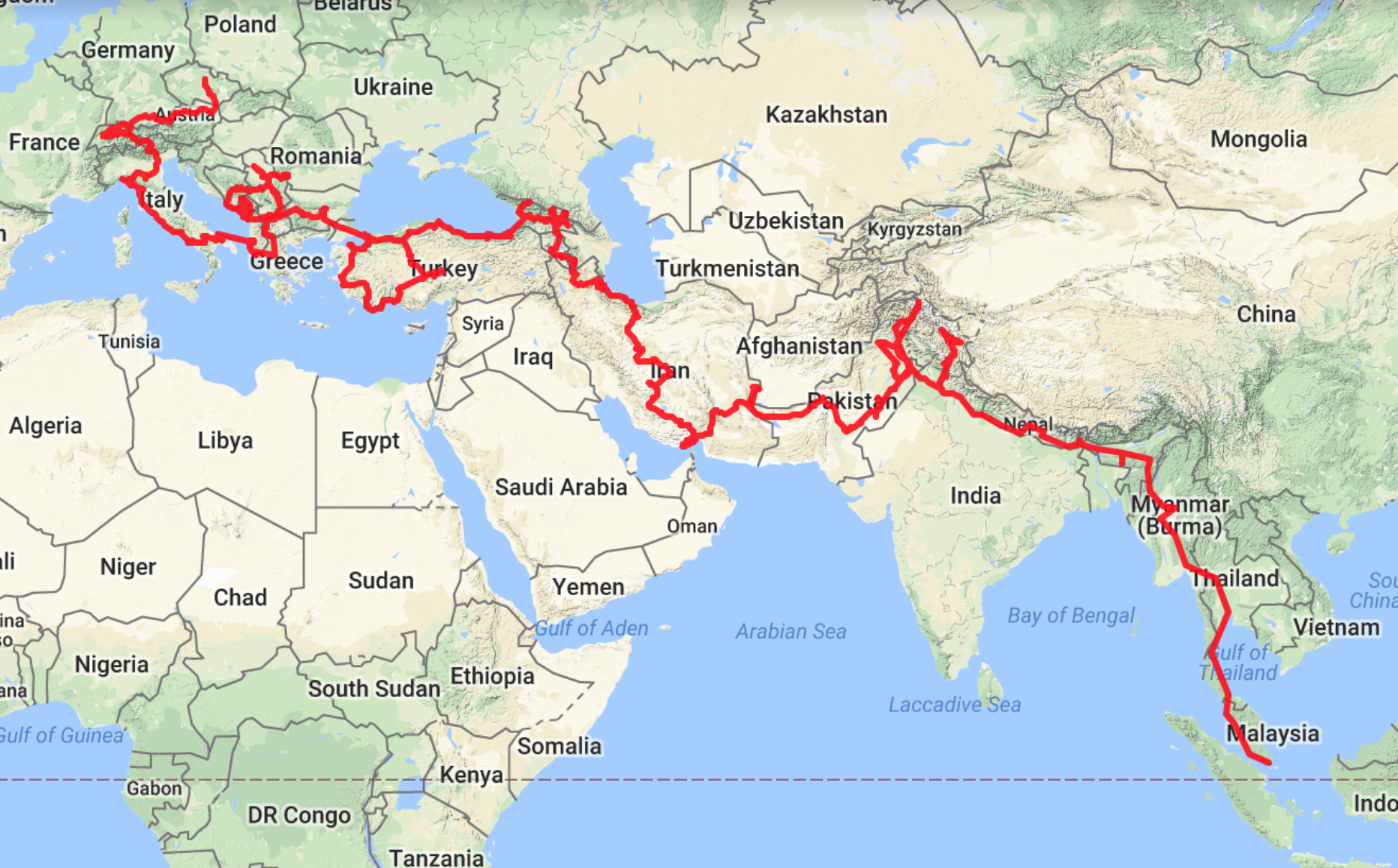 Along with some detours she made during the trip, Huang travelled some 44,000km in total. (Photo courtesy of Juvena Huang)
Along with some detours she made during the trip, Huang travelled some 44,000km in total. (Photo courtesy of Juvena Huang)
What these countries all have in common (and which largely influenced her decision to visit them): they either do not require visas for a Singaporean, or have a simple and short-enough application process.
"I'm a bit lazy and don't want to do paperwork," she explains, laughing, although in seriousness, pragmatism was what dictated her planning process — which would serve her well at various points on what may otherwise look like a very spontaneous journey.
Experiencing reverse culture shock
Not long after returning to Singapore, she tells us one of the biggest things she was struck by was the consumerist culture here — wherever she went, she says she feels like she was bombarded by calls to "buy, buy, buy".
In particular, she mentions noticing a lot of "Buy 3 Get 1 Free" labels on a whole range of products.
"I remember wondering, 'Why is there a need to buy so much stuff?'"
While she had not really thought about this growing up here, her time away made her see everything in Singapore differently.
After all, this was a stark contrast to her two-plus years as a nomad, travelling with just three sets of clothes and three sets of underwear, not having to worry about whether anyone would judge her for wearing the same clothes two days in a row.
Getting into a routine, fitting into a mould
Having a daily routine, doing socially acceptable things and meeting people's expectations is something so many of us take for granted, and even in some instances appreciate, but all these things became challenges for Huang too.
"I felt a bit disconnected with what's going on. Because all I did while travelling was just meeting people and worry about was where I was going to sleep and where to go next.
I lived from day to day. For those two years on the road, I let life take control of me. I just went with the flow. I don't exactly plan where I end up on the day itself. Sometimes when I see that the night is coming, I just look for a place to stay.
But after coming back here, I have to learn to take control of my life again. Because it's no longer the road steering you... You have to fall back into societal expectations again."
The issue of clothes and dressing comes up again — Huang realised she now has to have different outfits for different occasions like work interviews, her friends' weddings and yoga classes.
That's why the work she does these days is very freelance in nature, too — she admits she's unlikely to be able to settle into an office job, well, ever, and teaches tuition and yoga (which she picked up in a big way at no less than an ashram in India's Rishikesh, yoga capital of the world).
She also occasionally takes tourists on Vespa tours to supplement her income.
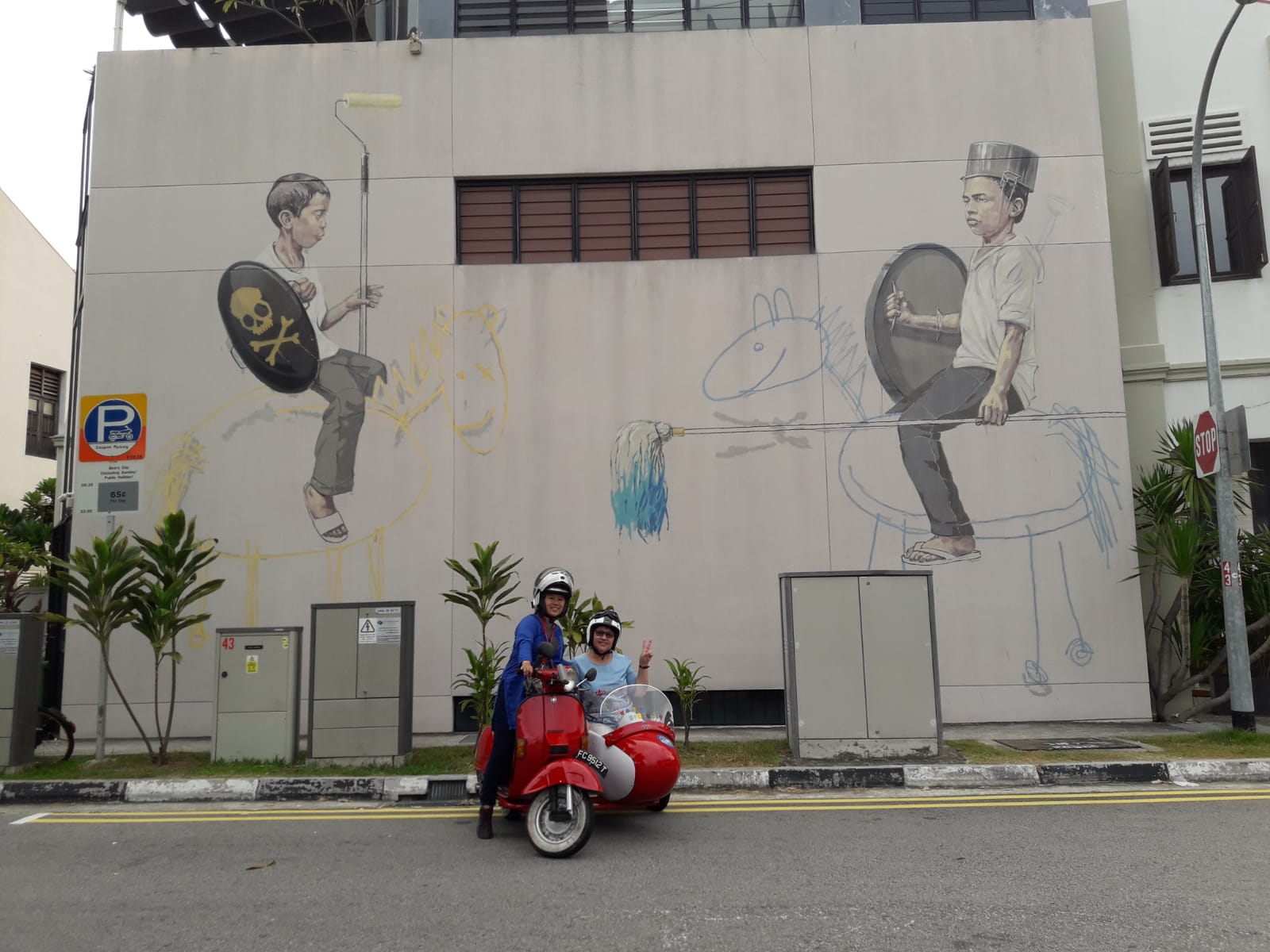 While Huang's mother was not comfortable enough to ride pillion on her bike -- not even to the nearby kopitiam -- she was able to ferry her mum around in a sidecar when she does freelance jobs for Singapore Sidecars. (Photo courtesy of Juvena Huang)
While Huang's mother was not comfortable enough to ride pillion on her bike -- not even to the nearby kopitiam -- she was able to ferry her mum around in a sidecar when she does freelance jobs for Singapore Sidecars. (Photo courtesy of Juvena Huang)
Leaving loved ones at home, and coming back to them
There was also, of course, the big challenge of leaving her loved ones back home.
Huang says the first time she called home, arriving in Thailand after barely a week, her mother cried over the phone.
So in India, she bought a GPS tracker that sends a text to her mum at various places to let her know where she happens to be at the time, which helped to assuage her worries about her welfare and safety.
She also made sure to Skype and FaceTime home regularly to show her where she was and the host family she was with. These, Huang says, all helped to put her mother at ease.
But even then, her mother still missed her, and that was actually what compelled her to end her journey in the Czech Republic:"When I was in Serbia, I was already planning to leave by flying back. But during my last few months in Serbia, I got a text message from my sister that said my mum was crying every day and that she thinks I should come back.
That's when I thought okay, I should go back... Before that, I was like 'I want to stay there for as long as I want', but now I can't, so I had to plan and make sure I get to Czech Republic."
One loved one she was concerned about in particular, though, was her pet dog Jeff, who came down with heart disease before she departed.
As a big-time dog lover, the sight of him getting skinnier every time she video-called home was one of the most difficult things for her to bear:
"The thing that I couldn't let go of was weirdly, not my family, but my dog.
I can still Skype with my family, and I can still talk to them, but you can't do the same for dogs. You need to be there for them and touch them, which I couldn't do.
When I Skyped with my mum, I saw my dog and how he lost weight and became so skinny.
My family sent me a video with him and the words 你知道我在等你吗 (do you know I'm waiting for you)?
I was in Italy at that time and I cried."
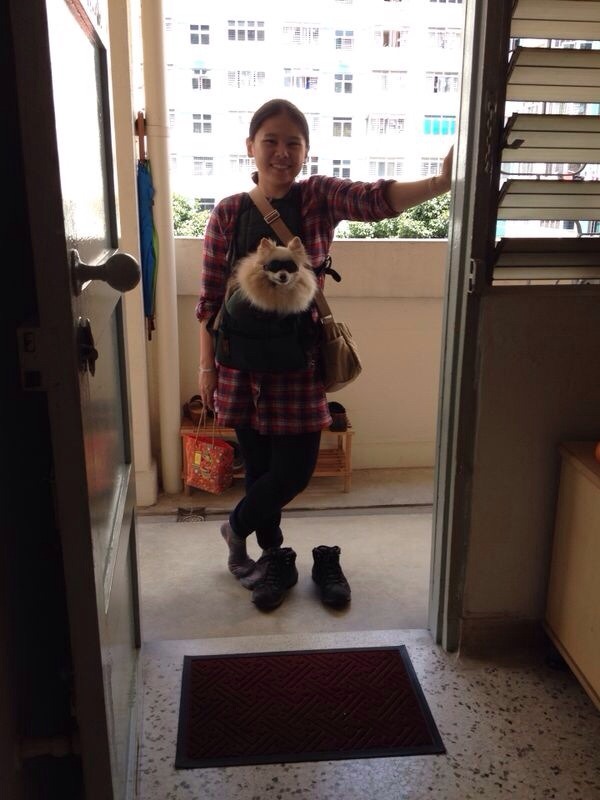 Huang used to carry Jeff with her on her Vespa, which is why he was wearing goggles in this picture. The picture was taken while they were doing some Chinese New Year visiting (Photo courtesy of Juvena Huang)
Huang used to carry Jeff with her on her Vespa, which is why he was wearing goggles in this picture. The picture was taken while they were doing some Chinese New Year visiting (Photo courtesy of Juvena Huang)
Although Jeff was already relatively old at 14 (for dogs) when she left, he held on till he was 16 years old before he eventually died.
Fortunately, Huang managed to make it back in time for one last goodbye:
"He waited for me."
Doing good wherever she can
Huang also does what she can to give back to the society that gave her the resources to travel as widely as she has.
She gives yoga classes to the elderly, the deaf, as well as people with physical and intellectual disabilities.
She also shares her experience, which in many ways people find inspiring too, at various events — just a few months ago, she spoke at the Singapore Female Festival, and most recently, she spoke to employees at DHL.
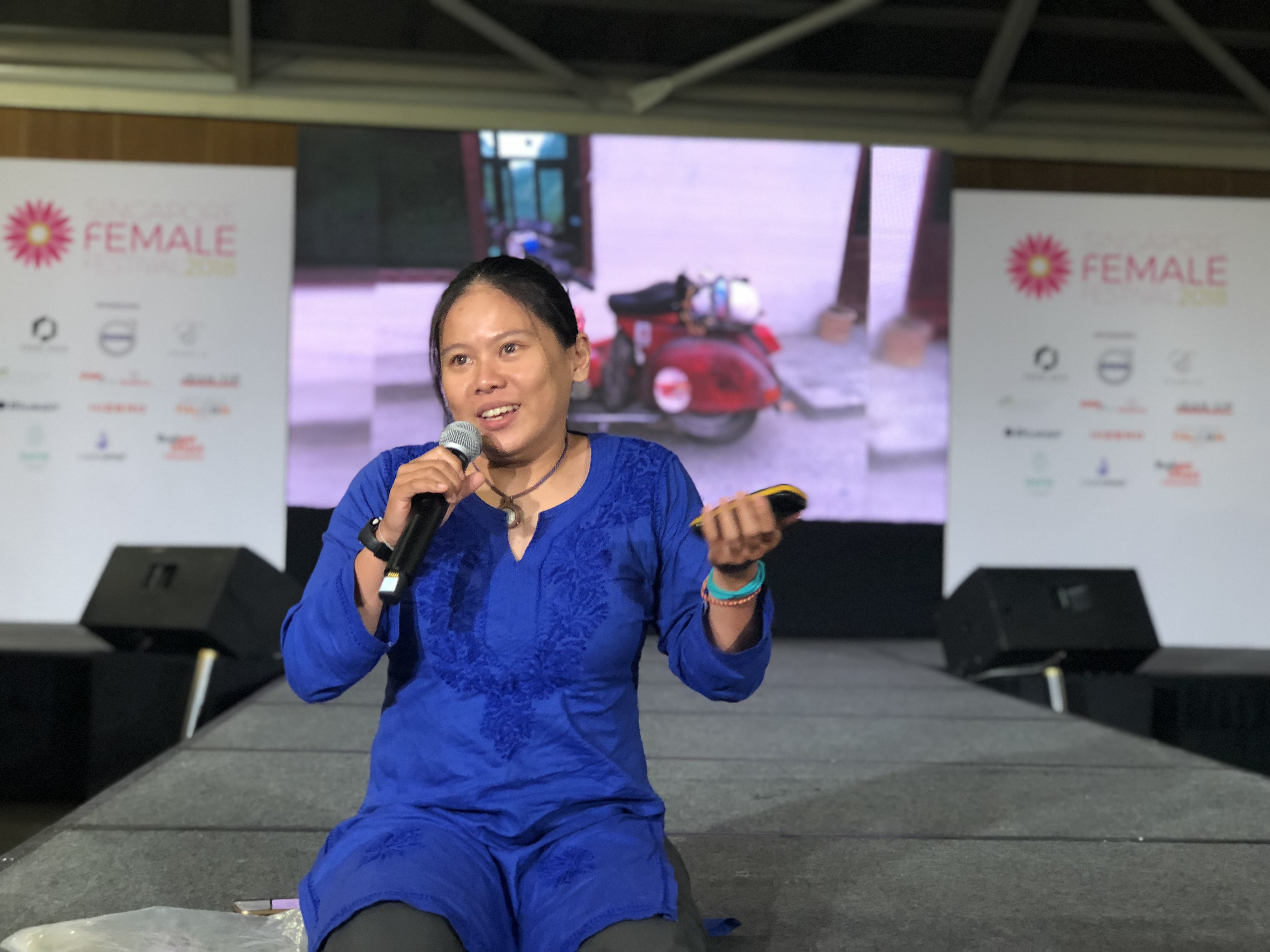 Huang at the Singapore Female Festival 2018. (Photo by Kayla Wong)
Huang at the Singapore Female Festival 2018. (Photo by Kayla Wong)
She is also working on a book about her journey.
Going to South America and Africa next
Huang is now saving up for her next big trip to Africa and South America. She says she wants to go see the fjords at Norway as well.
In the meantime, she has been taking small trips here and there using borrowed bikes.
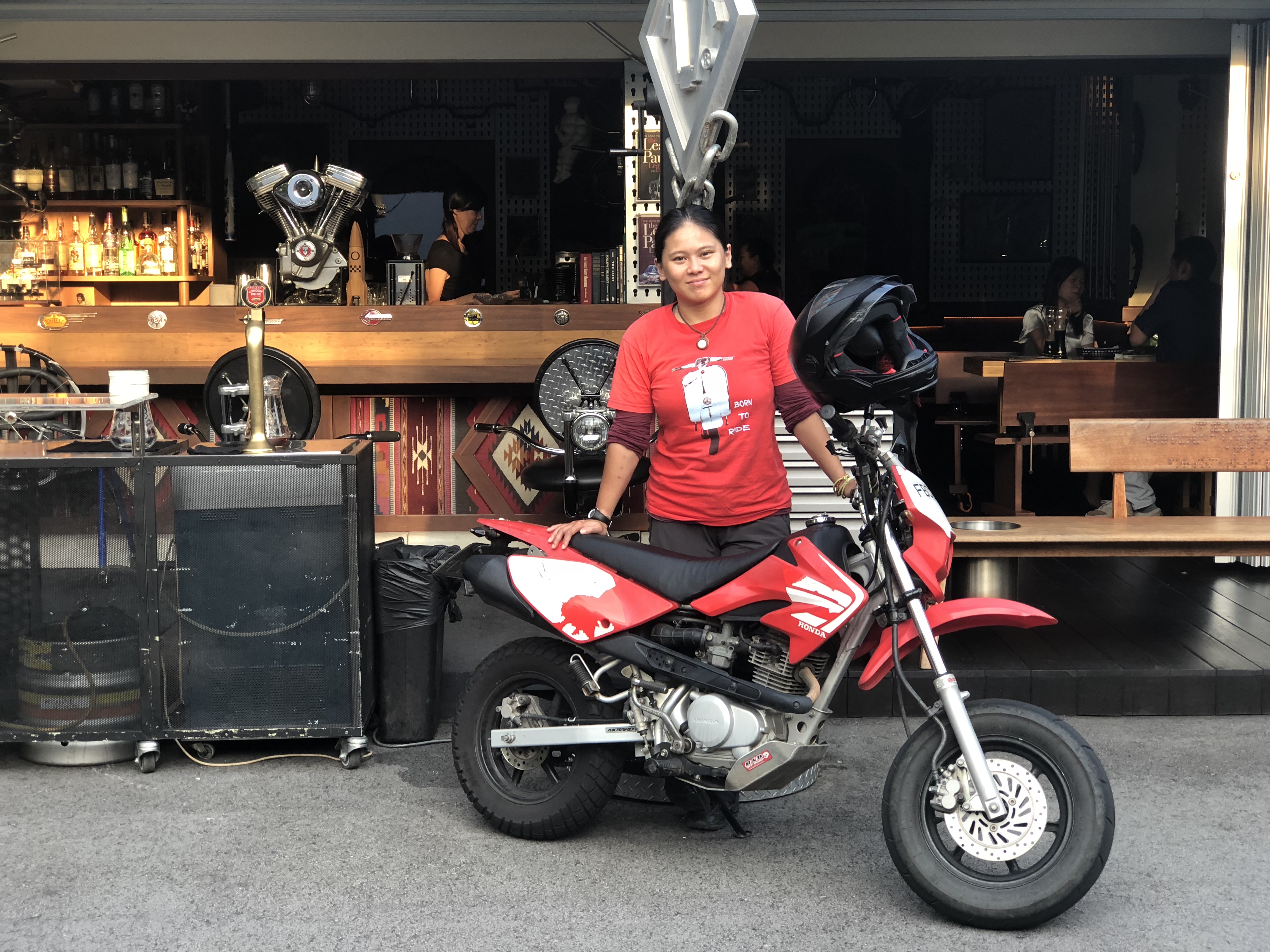 Huang pictured here with a friend's bike she's using while in Singapore. (Photo by Kayla Wong)
Huang pictured here with a friend's bike she's using while in Singapore. (Photo by Kayla Wong)
At the moment, Huang does not have plans to bring her Vespa back to Singapore, as it would in all likelihood end up getting cooped up indoors anyway — many aspects of it no longer meet current environmental standards in Singapore, and there's also that National Environmental Agency (NEA) ban on older bikes that'll be kicking in from June 2028 onwards:
"If I bring my scooter back, it's just going to stand there and not be used. So I can't be too attached either."
She might be donating Ebony Rouge to the Vespa museum in Italy, or continue her journey with it, but she'll have to register it with another country first, so she tells us she's still weighing her options.
3 parting lessons
Ultimately, by sharing her story, Huang hopes to encourage more Singaporeans to venture beyond the region to places less travelled:
"There's always alternative ways to do things. It doesn't have to be this way, or that way.
If you're complaining about your current situation, you've to do something about it, instead of doing the same thing but expecting a change."
She also advises aspiring travellers (or indeed, anyone who wants to pursue a dream) to do advance preparation first, but should not worry about being completely ready:
"If you want to do something, you cannot wait till you're '100 per cent' ready. You have to be on the job to learn it.
Yes, you should do some preparations first before leaving instead of going totally unprepared. But you've to just do it.
A lot of times, people don't even try, and then they give up and say they can't do it. They already impose this limitation onto themselves."
And lastly, she says, don't let anyone talk you out of what you want to do:
"We shouldn't let others impose their own limitations or fears onto ourselves.
If they can't do it, it doesn't mean that you can't.
If I had listened to them, I don't think I would have even went for the trip."
Top image credit to Barry Seah
If you like what you read, follow us on Facebook, Instagram, Twitter and Telegram to get the latest updates.
